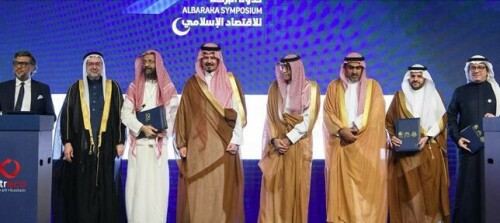New Shariah-Compliant ESG Index Launched in Madina
During the 45th AlBaraka Islamic Economics Symposium in Madina, the AlBaraka Forum for Islamic Economy and Spectreco LLC, a U.S.-based sustainability and technology company, finalized an agreement to introduce the world’s first Shariah-compliant ESG Index, according to a recent announcement.
Announced in the presence of Prince Faisal bin Salman Al Saud, Governor of Madina, along with prominent individuals in Islamic finance, the initiative represents a noteworthy advancement in values-driven investment strategies.
Spectreco CEO Faraz Khan MBE, a long-standing proponent of sustainable finance, characterized the partnership as a “powerful convergence of tradition, innovation, and global influence.”
Khan commented that as ESG laws and frameworks increasingly regulate the global landscape, the Islamic economy operates through Shariah principles.
He added that in the area of sustainability, the core principles of global regulations align and that they have created an index that harmonizes investor, business, and regulatory interests from both perspectives, acting as a bridge in sustainability and ESG laws.
The agreement integrates Islamic finance tenets with contemporary Environmental, Social, and Governance (ESG) benchmarks – a convergence that many stakeholders see as essential.
Sheikh Yousef Hassan Khalawi, Secretary-General of the AlBaraka Forum, stated that Islamic finance combines responsibility, sustainability, and transparency and that this collaboration builds a legacy that cherishes both people and the planet.
A Platform Based on Faith and Technology
This new framework will incorporate Maqasid al-Shariah – the ethical aims of Islamic law – into its assessment and reporting procedures, setting it apart from standard ESG indices. It also aims to employ AI-driven analytics, created by Spectreco, to deliver real-time ESG data that complies with Islamic financial standards.
The platform will evaluate investments based on sector-specific restrictions, financial ratio benchmarks, and ecological and social impact, intending to assist institutional investors, regulators, and Shariah-compliant asset managers seeking to incorporate ESG factors into their portfolios while adhering to religious requirements.
Addressing a Global Transition
This action occurs as ESG investing gains momentum in both established and developing markets. Projections indicate that ESG assets could exceed $50 trillion by 2025; however, there has not been an index that provides a faith-based ethical framework for Muslim investors on a global scale until now.
The Islamic ESG Index will initially concentrate on markets within the Gulf Cooperation Council (GCC), Europe, and Southeast Asia – regions distinguished by significant Muslim communities and rising ESG mandates.
The platform is promoted as a transformative instrument for Islamic finance organizations navigating a rapidly changing investment environment by providing dynamic transparency, continuous monitoring, and automated Shariah screening.
Khan stated that it is not only about adhering to global standards but elevating them, demonstrating that faith and sustainability are profoundly compatible, not mutually exclusive.
He added that as an institution and a team, they are driven by cooperation through technology for impact in the fields of ESG and sustainability, as well as the creation of climate finance sources.
A Key Turning Point
Observers note that the launch’s setting in Madina, one of Islam’s most sacred cities, was both symbolically significant and strategically astute. While financial innovation is frequently linked to centers such as New York, London, or Dubai, the message from Madina was unmistakable: ethical finance rooted in spiritual values can emerge from the very essence of faith.
The initiative remains in its initial phases, with additional announcements on implementation timelines and collaborations anticipated. However, the message is currently resonating: as the globe seeks financial systems that are robust, transparent, and equitable, Islamic finance may have more to contribute than ever before.



Comments (0)
No comments yet. Be the first to comment!
Leave a Comment